 As much as I would prefer to spend my days watching the animals, walking the woods, maybe going fishing now and then, there is a town down there in the valley, and we do have to get there now and then. Work, shopping, repairs, the library… all these things and others call us out of our highland hideout. One of the pressures that leads us into town is citizen activism.
As much as I would prefer to spend my days watching the animals, walking the woods, maybe going fishing now and then, there is a town down there in the valley, and we do have to get there now and then. Work, shopping, repairs, the library… all these things and others call us out of our highland hideout. One of the pressures that leads us into town is citizen activism.
It’s almost Independence Day, so today you get my little civics lesson: Government is not just for the big. That mantra from the 1960s and ’70s, “Think globally, act locally,” is still good.
To my surprise, we became more active and, I think, more effective in small ways, when we moved out from town. We always wrote our share of letters to Congress, and we went to Town Hall meetings to meet our Congressman, but something happened to our looking glass when we moved away from the urban clot and into a smaller community. Almost immediately we turned up at a community meeting, and then it was a watershed management meeting, a County Commission meeting, a forest management meeting, a community training meeting… and pretty soon we were on first names with the electeds, with the appointeds, and with the employeds in the County offices. Somehow, then, we got ourselves appointed (and later elected) as Precinct Committee People to the Clackamas County Democratic Party; PCP is the hat worn at the lowest rung of the Party structure. PCPs are the people who run around knocking on doors before elections, or who call you at dinner time and remind you to vote. They’re the people who observe in the polls on election night. They’re the ones who offer voter registration cards at fairs and supermarkets.
It has to be said, I am not much of a joiner of groups. I’m shy of bunches of people, and I don’t really like speaking in public. So for me to decide to offer myself as a PCP was a big indication of what I thought was important. In time, as so often happens when you join something, we found our own little projects to attend to. And, typically, they were not the ones that led us into giant committee meetings.
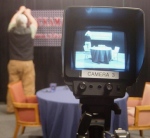 Once a month the Clackamas Democrats air a live TV broadcast through the local cable access channels. It’s taped at a wonderful little studio facility in Oregon City called Willamette Falls Television (WFTV). It doesn’t get much more local than this. WFTV is available for use by anyone who lives or works in the County. Any of us can go in and create a television program. The equipment is available to us at no charge, and training in its use goes with the loan. The studio comes with staff to help in live broadcasts, or in editing programs to be aired later. It’s the neatest thing. And the show was chronically short of “techies,” people to operate the cameras or to field phone calls or to type names into the character generator.
Once a month the Clackamas Democrats air a live TV broadcast through the local cable access channels. It’s taped at a wonderful little studio facility in Oregon City called Willamette Falls Television (WFTV). It doesn’t get much more local than this. WFTV is available for use by anyone who lives or works in the County. Any of us can go in and create a television program. The equipment is available to us at no charge, and training in its use goes with the loan. The studio comes with staff to help in live broadcasts, or in editing programs to be aired later. It’s the neatest thing. And the show was chronically short of “techies,” people to operate the cameras or to field phone calls or to type names into the character generator.
So, for about the last 2 years, Richard and I meet in town once a month on a Tuesday evening, have dinner, and then go off to the WFTV production studio. Here’s Richard, just before air time last week.
That’s the control booth below, with Marv inside. Marv is the director.
The program, a sort of no-budget version of the Charlie Rose show, hosts local officials, candidates and activists in interviews about local concerns, programs, issues, choices, and people. Since it’s live, and most of the staff is volunteer, sometimes the show has warts. That goes with the effort. We’re doing the best we can. Here’s me reading the Oregon Party Platform into a microphone with program host Larry Skidmore in the background:
It turns out there are lots of opportunities for rural, suburban, and urban people to come together for common efforts. We helped build a house for Habitat for Humanity a couple of years ago. We’ve helped clean up river banks with Tualatin Riverkeepers. We’ve picked up the litter along our own piece of road for several years now (in exchange for that we get a road sign with our name on it: Shambles Workshops, which is our marketing name).
I’m comfortable doing behind the scenes things like this. Behind the camera. Behind the hammer and the screwdriver. Behind the trash bags.
But, last year there came a cause I had to stand in front of. Our County needs a service district to fund the public libraries. Because of the recent loss of Federal timber revenue dollars in Oregon, money that had supported the General Funds of rural counties across the United States but is no longer authorized by Congress, services like public libraries are threatened with extinction here. I mean it. Really. Can you imagine a place without public libraries? Our own state legislature couldn’t, and in 1901 enacted the bill that permitted public funding of libraries that were to be “free to the public forever.” They authorized communities to assess up to $.35 per $1,000 of property value to support those libraries. What happened then? The libraries went to the voters for finance levies, looking for that 35 cents per thousand dollars. And for a time, they got it, or enough of it.
But the 21st Century has rolled around and there still is no stable means of funding those libraries. They are still grasping at shrinking General Fund dollars, and still attempting, every few years, to get the voters to pass a levy. It’s a disaster just about now, what with Oregon’s “double-majority” requirement to pass funding levies (+50% of the ballot, and +50% of registered voters voting) and the current mood of voters not to pay for anything, though they might want to continue to use it, and will complain when it’s gone (ever notice how the loudest anti-public-services voices still expect the fire department to show up?). So we, some of us Citizen Activists, are going to make a Library District. We are building the campaign, we’re raising money, we’re meeting after work, and testifying during stolen work hours, phoning and polling and printing, and speaking to groups. Good grief. I am speaking to groups. I’m going to business executives and begging money. I am compiling telephone numbers and email addresses. I’m acting just like someone with a cause.
Because, honest to goodness, I cannot imagine a County without a public lending library.
And that, my friends, is what I mean when I speak of The American Way. If you want to see something happen, you go to work to make it so. You make a phone call. You wear a button. You stand up in front of people and talk to them about it. You “speak your mind, even if your voice shakes,” as Grey Panther Maggie Kuhn said. Because, when it comes down to it, the issue isn’t whether your presentation has warts. It’s live, after all, and it’s life. It’s what we do here.
If you live in Clackamas County, Oregon, please vote for the Library District in November. It’s only $.39/$1,000. That’s less than a nickel more than than the legislature thought was appropriate 107 years ago.
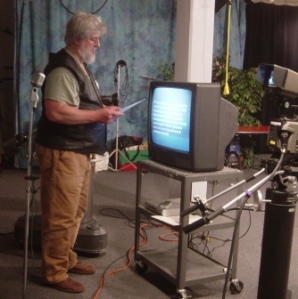
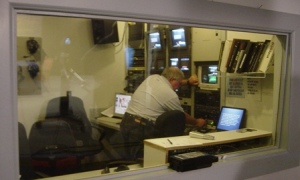
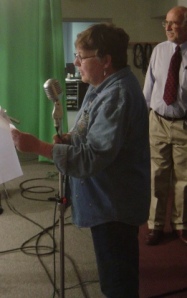
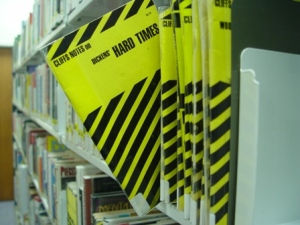
In point of fact, the 35 cents per $1000 107 years ago
would be worth $9.63 today. I’ll leave it for others to decide how to compensate for the change in value of the underlying real estate over the years. The point is that libraries are a bargain; an essential part of the education system, particularly now that schools are so underfunded that they can’t afford up-to-date text books, let alone quality in-house libraries.
In my former life as an actor, the first thing we did when we arrived in a new town for a season, however short, of theater, was to acquire a local library card. The Internet notwithstanding, I don’t know many professionals who don’t use the library. And for those whose only access to the Internet is the public library, failure to fund would be tantamount to foreclosing almost all resources to those who can’t afford to buy books.
I’m sure Susan will correct me if I’m wrong, but nearby Portland (making up most of Multnomah County) has one of the best, and best used, public libraries in the country. This, in spite of its also having more book stores per capita than almost anywhere else, including Powell’s Books, that legendary multi-square block of stores that serve up new and used books on the same shelves, the home of the first in-store coffee shop.
It’s embarrassing to be such poor cousins to a county with such riches.
ry
I am a new reader and live in Wyoming where some counties have vaste resources and the neighboring county not because of mineral revenue. Why has the Federal timber revenue dropped? Is it because of the decline in building new homes and decreased demand for lumber or because of not being allowed to harvest timber on Forest Service lands?
The history of the Federal timber money is long and complicated. The story goes back to the 1860s and the construction of the Oregon and California Railroad. At the time of construction, the US Government took lands from the states and awarded them to the railroad company, maintaining that development of the rail corridor was in the public interest. The railroad acquired a checkerboard of acreage on both sides of the rail line, extending 20 miles from the line each way. This acreage was to have been made available for sale to settlers at a rate of no more than $2.50 per acre, and in parcels no greater than 160 acres each. The idea was to encourage development of communities and commerce along the rail line, and compensate the company for the costs of creating the railroad. That would have been fine, but the temptation to make a really big buck was too great to resist: the rail company took to finding folks on the Portland waterfront who would sign application papers for land purchases (folks who had no intention of settling along the rail line) and then re-selling the blocks of acreage at up to $40/acre. It took a very long time for the US and the railroads to reach a settlement in this complicated net of rail companies, individuals, states, and the US. Finally, in 1915, U.S. Supreme Court decided that since the railroad had been built as promised, railroad company should not be required to forfeit its rights to the lands, in spite of the fraud committed and the violation of the original grant. In 1916, Congress took back the lands and compensated the railroad as if it had sold the acreage for the originally proposed $2.50.
Now this land, over 2 million acres, belonged to the Federal government and was not available for taxation by the states, depriving the states of the revenue from lands within their boundaries. I believe it was not until the 1930s that Congress created a means of compensating the states for the loss of revenue from the O&C lands. They granted the states 50% of the revenues from the sale of timber harvested in the (now) Federal O&C checkerboard. That is what is known as the Federal Timber Revenues, and the revenue went into the General Funds of the states and provided for services to rural schools, for police, for public safety, and (my agenda now) for public libraries.
Congress is called upon to reauthorize programs like this at intervals, and in the fall of 2006, under the guidance of the George W. Bush administration, it declined to do so. The loss amounted to $400 million dollars to 41 states. In Oregon, the loss was $150 million.
That, long as it is, is the short history of the matter.
S.
Good Luck saving your libraries!
I found myself suddenly “active” when we went rural as well. Our battle was for adequate school funding. The cost saving measure was a consolidation of all our town schools (!) We put it off… for a while anyway, but I learned a lot about funding inadequacies and “economies of scale”.
Sigh….
And libraries! I can’t imagine a town without a library– though ours is only open for a few hours twice a week at this point.
Perri
I think, when you move to a small community, you suddenly feel (if not exactly included) less excluded. Suddenly the scale of the landscape changes and you are now on your very own turf instead of in a place owned by commerce and development. It’s bigger than a neighborhood association, but smaller than a state. The County Commission becomes accessible, you know the guy in the roads department, you get calls from the gal who always wants petitions signed, and emails from the guy who always runs for the same district office (“This time is the charm!”). Out here, if you’re stopped by the road someone will pull out and ask if everything is OK. You could run naked in your yard and no one would see you, but all the neighbors will know if you’re putting in a new well. It isn’t Mayberry. It isn’t Walton’s Mountain. But it’s not Town, either. It’s been a very good shift for us.
S.
As a retired librarian, I thoroughly applaud your efforts! Libraries cost so little, and you get so much out of them!
I’m reading your haying and veggies posts. Sigh.
Thanks, Ruth. We’re working on it.
S.